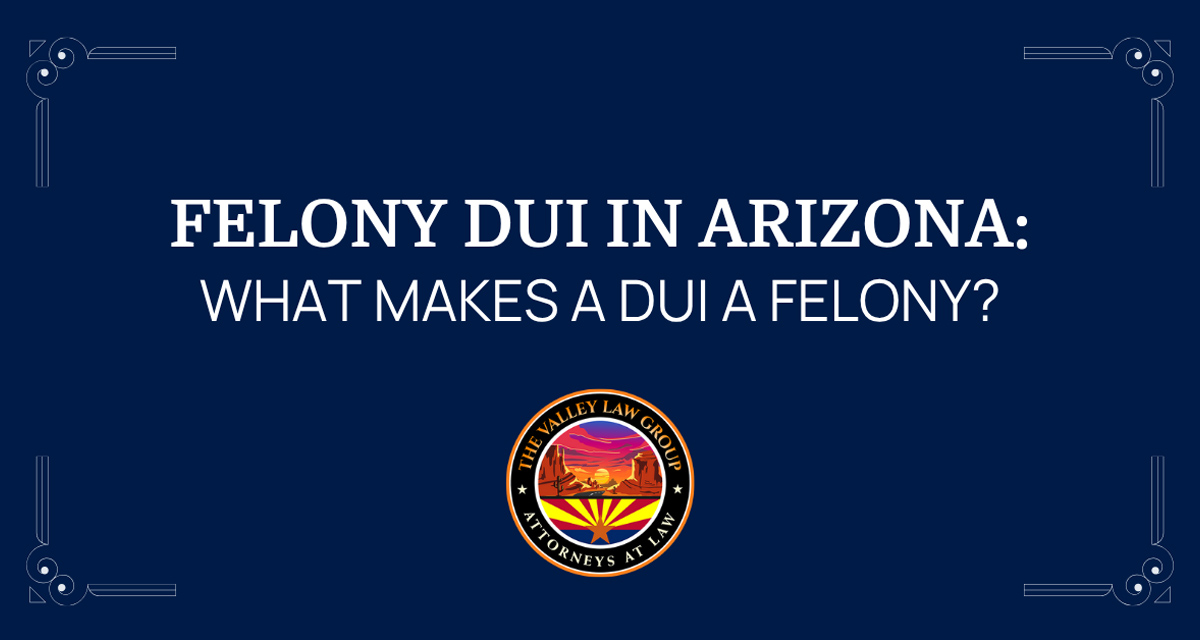Table of Contents
Toggle

In Arizona, as in the rest of the United States, it is illegal to drive while under the influence of drugs or alcohol. According to ARS §28-1383, if you are found to be driving with a blood alcohol concentration of 0.08% or higher, you can be arrested and charged with a DUI. As with other offenses, however, there are several factors that can affect whether DUI is charged as a misdemeanor or a felony, which carries heavy penalties.
Felony DUI charges are serious, but they don’t mean you’re out of options as long as you secure formidable legal representation. Learn more about felony DUI in Arizona and what to do if you are facing these charges.
What Is a Felony DUI in Arizona?
As classified under ARS §28-1383, a felony DUI can also be referred to as an aggravated DUI in Arizona. Aggravating factors are other circumstances associated with a criminal action that can heighten the severity of the crime and increase the resulting penalties.
According to this law, an aggravated DUI involves one or more of the following circumstances:
- The individual committed a DUI offense while driving with a suspended driver’s license
- The individual has been convicted of three or more DUIs within the past seven years
- The individual committed a DUI offense while a minor under the age of 15 was in the vehicle
- The individual committed a DUI offense while having a court-ordered ignition interlock device
- The individual drove in the wrong direction on a highway while driving under the influence
- The individual refused a court-ordered blood alcohol test
Driving with a Suspended License
Under ARS 28-1383, driving with a canceled, revoked, or suspended license is an aggravating DUI factor that can result in felony charges. In these cases, penalties are more severe because the individual is not only driving when they are barred from driving, but also doing so while intoxicated. It is important to note that the associated license suspension does not need to be due to a previous DUI to be considered an aggravating factor.
Third DUI within Seven Years
A third offense DUI in Arizona can result in felony DUI charges. This rule applies when an individual has been charged with a third DUI after two DUI convictions within 84 months (seven years).
Driving with a Minor Under Age 15
DUI charges can be elevated from a misdemeanor to a felony when minors are in the vehicle during a DUI stop. If children under the age of 15 are in the car and the driver is found to be under the influence of drugs or alcohol, authorities will assess felony DUI charges.
Driving in Violation of an Ignition Interlock Device
If an individual is ordered to install an ignition interlock device in their vehicle due to a prior DUI, it must remain installed in the car for the entire time as stipulated in the court order. Driving without the device or tampering with the device and then receiving a DUI can lead to felony DUI charges.
Driving in the Wrong Direction on a Highway
According to ARS 28-1171, a highway refers to the entire width between the boundary lines of every road publicly maintained by the federal government. Drivers must remain within the boundary lines on the right-hand side of any road. Drivers found to be driving while intoxicated against the flow of traffic on a public road can be charged with felony DUI.
Refusing a Court-Ordered Blood/Alcohol Test
In Arizona, refusing a blood alcohol test can be treated as a felony under certain conditions. Refusal violates the state’s implied consent law, which requires drivers to submit to chemical testing if suspected of DUI. Refusal can lead to felony charges if the driver has prior DUI convictions or if the refusal occurs during a DUI investigation involving aggravated circumstances, such as causing serious injury or death.
Felony DUI Classifications & Penalties

Arizona classifies felonies as Class 1, 2, 3, 4, 5, and 6, with Class 1 felonies involving the most severe crimes and Class 6 being the least serious. Felony DUI penalties in Arizona vary depending on the severity of crimes associated with each class.
Class 4 Felony DUI
A Class 4 DUI in Arizona is a common felony DUI that results in legal consequences, including a prison sentence of 4 months to 3.75 years. The minimum 4-month sentence is mandatory, but sentencing may be longer for those who have committed prior felonies.
Other penalties associated with this class may vary depending on the circumstances involved.
The following felony DUI penalties in Arizona are most often associated with this charge under ARS 28-1383:
- Fines
- License suspension or revocation
- Mandatory placement of an ignition interlock device in the vehicle
- Probation period requiring supervision with occasional urine testing
- Loss of voting rights
- SR-22 insurance
- Alcohol treatment program
Class 6 Felony DUI
Driving under the influence of drugs or alcohol with a minor under age 15 in the vehicle is considered a Class 6 felony DUI. This is the only type of DUI that falls under the Class 6 classification. While a Class 6 felony is considered slightly less severe, it still can have life-altering implications.
The penalties for this classification typically involve:
- Fines
- A prison sentence of at least four months
- A license suspension, revocation, or license restrictions for a certain period
- Required alcohol treatment, education, or screenings
- Completing a certain number of hours of community service
- Installation of ignition interlock system
- Potential need for SR-22 insurance
Felony DUI vs. Misdemeanor DUI
A DUI felony versus misdemeanor DUI can mean significant differences in the criminal act and penalties involved. Here are the basics:
Misdemeanor DUIs
A misdemeanor DUI can refer to a first offense DUI that is a standard DUI without any other aggravating factors. In other words, misdemeanor DUI involves an individual who has driven with a BAC of 0.08% or higher but has less than two DUIs within the past seven years and committed no other traffic violations during the incident.
The penalties for a first offense DUI include:
- Having an ignition interlock device installed in your vehicle
- Mandatory drug and alcohol screenings, treatment, or education
- Mandatory traffic education classes
- Up to 10 days in jail or prison
- Fines of at least $1,25
- 90 days to 1 year driver’s license suspension
If you are convicted of a misdemeanor DUI, it will remain on your permanent criminal record. There may be situations in which you qualify to have the misdemeanor expunged if you fulfill the requirements. The impact of a misdemeanor DUI can be a costly inconvenience, and it may also affect your standing in the community as well as your career. If you are facing misdemeanor DUI charges, it is wise to consult with a qualified DUI attorney.
Felony DUIs
As mentioned, a felony or aggravated DUI comes with aggravating factors besides the BAC of the driver. Factors like driving with a license that was suspended and driving with a minor under the age of 15 in the car increase the severity of the crime of driving while intoxicated. This results in penalties that are more severe than those associated with misdemeanor DUI.
Felony DUI heightens the severity of these DUI consequences:
- Prison Sentence – Prison terms increase from 10 days for a misdemeanor DUI to at least 4 months for a felony DUI
- Fines – Fines assessed for a felony DUI sharply increase from the relatively minor fines triggered by misdemeanor DUI, ranging from a mandatory minimum of $2,500 to as much as $150,000 with surcharges.
- License Suspension – Felony DUI can mean suspension of the individual’s driver’s license for at least a year, with longer periods or even permanent revocation in some cases.
- Ignition Interlock Device – Felony DUIs typically trigger mandatory ignition interlock device placement for a minimum of two years, compared to the one year for misdemeanor DUIs.
As an aggravated DUI is a felony criminal charge, it will result in a permanent criminal record unless you later qualify to have the charge set aside. The impact of this charge affects many aspects of your life, and you may face difficulty finding or keeping employment, difficulty obtaining housing, trouble with professional licensure, and the loss of your right to vote or own firearms. It is essential to secure the services of a skilled felony DUI attorney in Arizona.
What to Do If You’re Facing a Felony DUI Charge

If you are arrested for a felony DUI, the most important thing you can do is invoke your right to remain silent. Anything you say or do could be used against you. Consider consulting with a lawyer before speaking with law enforcement, and do not admit that you were at fault, even casually.
After your arrest, it is crucial to hire an experienced DUI criminal defense attorney as soon as possible. The earlier an attorney can begin to assist you in your case, the more likely you are to secure a positive outcome. Your attorney will advise you to maintain records of all pertinent information, such as the details of your arrest or any discussions with law enforcement, which may prove to be vital evidence for your case. As your case proceeds, be sure to comply with all court orders to avoid further charges.
While Arizona DUI laws are some of the most stringent in the country, it is possible to avoid the most severe penalties. Strategic defense planning can help you achieve reduced sentencing, diversion, or even dismissal of your charges. An experienced DUI lawyer can review your legal options and help you build a defense that is effective for your situation.
Can a Felony DUI Be Reduced or Dismissed?
A felony DUI can be reduced or dismissed, but it is crucial to seek legal counsel as early as possible so your attorney can help you develop the right strategy.
Common options include:
Plea Deals
A plea deal could potentially reduce your penalties if you are willing to plead guilty to a lesser charge. A common plea deal used to reduce an aggravated DUI involves pleading guilty to a standard DUI or reckless driving while intoxicated (also known as “wet reckless”). Another option involves sentence reduction, enabling you to plead guilty to an aggravated DUI in exchange for a lesser sentence compared to the maximum penalty.
Negotiated Reductions
It is also possible to achieve a more favorable outcome through other negotiations with the prosecution. Providing strong evidence that there were other critical factors that contributed to your DUI may help you achieve a reduced sentence compared to a felony DUI conviction with the maximum penalty.
Inadmissible Evidence
A BAC over the limit does not necessarily lead to a felony DUI. Law enforcement officers must follow strict procedures to gather this evidence in a legal manner. An attorney may be able to help you prove that there were issues with the testing equipment, a faulty chain of custody regarding your test results, or other problems with your arrest. Invalidating the evidence associated with your DUI could lead to the reduction or dismissal of your charges.
Our Comprehensive DUI Defense Service
The Valley Law Group understands the importance of building a strong defense for criminal DUI charges. This is why we approach every unique case with a solid DUI defense strategy highlighted by personalized representation.
During your initial consultation, our DUI attorneys will meet with you to assess the situation, discuss the details of your case, and advise you regarding your rights. We will then conduct a thorough investigation to gather evidence and build a personalized defense. During the investigation, we will meet and negotiate with prosecutors and explore the potential to reduce or dismiss your charges. If your case goes to trial, we will present your defense and represent your interests in court.
Our compassionate defense does not end when your court proceedings are complete. If you are convicted, we offer post-conviction support to help you navigate the consequences.
Felony DUI FAQs
The DUI defense team at The Valley Law Group has developed years of experience representing Arizona residents as they face felony DUI charges.
Review these common DUI questions to improve your chances of a positive outcome in your case:
No. Not every DUI in Arizona is a felony, as many DUIs are considered misdemeanors. A DUI charge is elevated to a felony when certain aggravating factors are in place. For example, driving with a suspended license or driving the wrong way on a highway while committing a DUI offense can result in a felony DUI.
In Arizona, an aggravated DUI and a felony DUI generally refer to the same criminal offense. This type of DUI involves aggravating factors that elevate the charge from a misdemeanor to a felony.
Yes, you can go to jail for a felony DUI in Arizona. Even first-offense felony DUIs are associated with a mandatory jail or prison sentence. The length of time that you are required to serve varies depending on the circumstances. For example, committing prior DUI offenses or driving with a minor in the vehicle can trigger harsher penalties.
Yes, you may be able to have a felony DUI set aside, meaning that the criminal conviction may be treated as if it had never occurred. While this does not mean that the sentence is completely erased from your criminal record, it will not be visible during basic background checks. To have a felony DUI set aside, you must first complete the requirements of your conviction, such as paying any fines, completing a prison sentence, or a probationary period, then apply for expungement so the court can determine your eligibility.
Consult With A DUI Defense Attorney Today

A felony DUI charge in Arizona is serious, but it doesn’t have to define your future. Contact The Valley Law Group today to schedule your free consultation and learn more about how we can help you protect your rights.
Sources:
- Arizona Revised Statutes § 28-1381. (n.d.). Driving or actual physical control while under the influence; violation; classification; definition. Retrieved March 31, 2025, from https://www.azleg.gov/ars/28/01381.htm
- Arizona Department of Transportation. (n.d.). Future Financial Responsibility (SR-22/26). Retrieved March 31, 2025, from https://azdot.gov/mvd/services/driver-services/license-reinstatement/future-financial-responsibility
- Arizona Revised Statutes § 28-1171. (n.d.). Definitions; off-highway vehicles. Retrieved March 31, 2025, from https://www.azleg.gov/ars/28/01171.htm
- Arizona Department of Transportation. (n.d.). Driving Under the Influence (DUI). Retrieved March 31, 2025, from https://azdot.gov/mvd/services/driver-services/driver-improvement/driving-under-influence-dui
- Arizona Revised Statutes § 13-702. (n.d.). Sentence of imprisonment for felony. Retrieved March 31, 2025, from https://www.azleg.gov/ars/13/00702.htm

Jon McCarty has broad experience in a wide variety of family law matters. After graduating from the University of Illinois College of Law with the highest honors, Jon served as Law Clerk to The Honorable David Briones in the United States District Court for the Western District of Texas. Jon then spent several years practicing in a large law firm in Chicago, before starting his own multi-state practice concentrating in family and criminal law.

